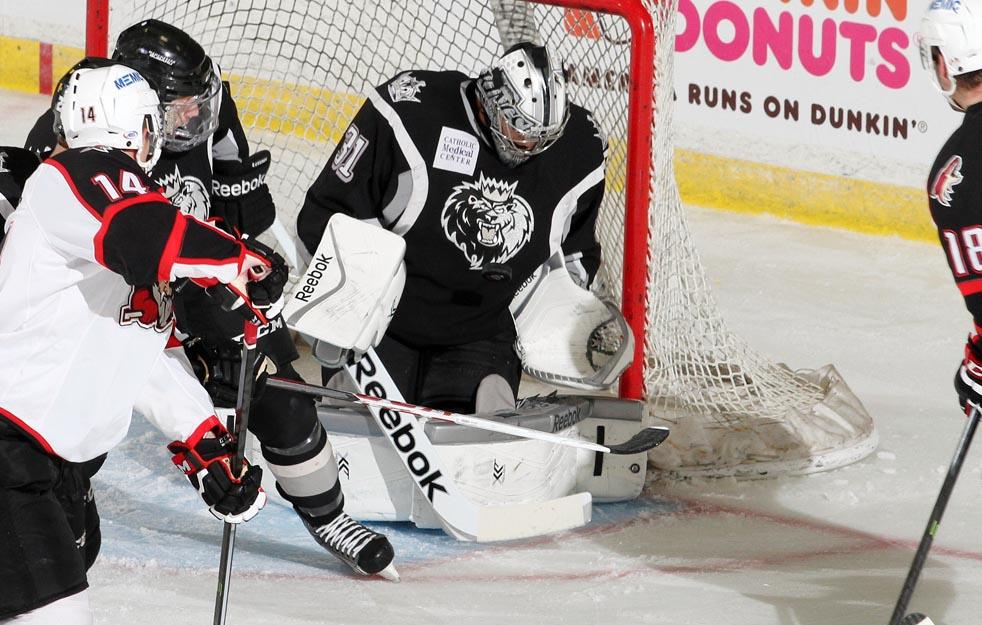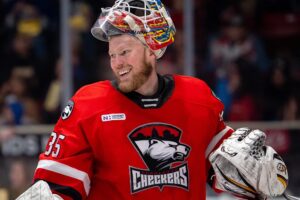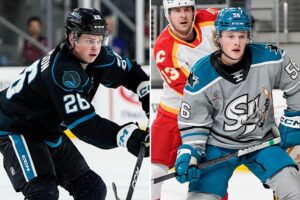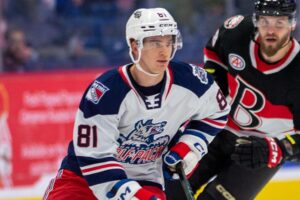by Nick Chacos || AHL On The Beat Archive
The Manchester Monarchs’ 2013-14 regular-season campaign has gotten off to a terrific start, with the team winning 22 of its first 34 games and accumulating an American Hockey League-best 49 points.
The Los Angeles Kings, the parent organization of the Monarchs, have experienced their own degree of success this season, ranking fifth in the NHL’s Western Conference with 54 points as of Monday.
In an era where free agency is often considered the fast route to building a successful franchise, the Kings organization has been dedicated to developing a strong foundation in Manchester.
The process of allowing players time to develop in the AHL enables them a chance to familiarize themselves with the culture of the franchise and mature as a player. The largest benefit of the process may be the idea that players in Manchester can learn a system that is used in Los Angeles, allowing a virtually seamless transition for players when they get the call up to the Kings.
The opportunities that players are given to develop their talents and feel like an important part of the franchise are instrumental in the success of both the Monarchs and the Kings.
Los Angeles is a competitive team with a lot of potential moving forward. They have made the playoffs the last four consecutive seasons, won the Stanley Cup in 2012, and returned to the Western Conference Final last season before falling to the eventual Stanley Cup champions, the Chicago Blackhawks. The last time the Kings appeared in four consecutive postseasons was from 1986-93, when they made the playoffs in seven straight seasons including an appearance in the 1993 Stanley Cup Final.
Now, the Kings franchise seems to be in a position to stay relevant for years to come, with a combination of young talent on their bench and playing in Manchester for their AHL affiliate. In their 2012 Stanley Cup championship run, the Kings made history by becoming the only eighth-seeded team to ever reach the Final, let alone take home the Cup itself.
The team’s Cinderella championship roster included 14 players who had previously taken the ice for the Monarchs. Goaltender Jonathan Quick, who played in 33 games for the Monarchs between 2007-09, won the Conn Smythe Trophy, which is awarded to the playoff MVP each year. It is safe to say that the time and development that the players have endured in Manchester was a key factor in helping the organization claim their first-ever Stanley Cup trophy.
This year, half of the Kings active players have worn a Monarchs jersey at one point during their career. Players such as left wing Dwight King and defensemen Slava Voynov and Jake Muzzin all spent time playing and developing in Manchester before joining the Kings in Los Angeles.
Collectively, former Monarchs skaters have contributed to 38.5 percent (104 of 270) of the total points the Kings have scored this season. In addition, former Monarchs goaltenders have led the Kings to an 18-6-0 record this season.
There are plenty of variables and unforeseen factors that impact the outcome of an NHL season, but the Kings have shown that they are capable of handling those challenges and continue making strides. When Jeff Carter was placed on injured reserve at the beginning of November, Monarchs right wing Tyler Toffoli and center Linden Vey got the call-up to Los Angeles to help fill the void created by the goal scorer’s absence. Since then, Toffoli has registered 17 points (9g, 8a) in 25 games and ranks fifth on the Kings in goals. Vey was able to contribute five assists in 14 games before returning to Manchester.
After winning six of eight games following the addition of Toffoli and Vey, the Kings called up Monarchs left wing Tanner Pearson, who gave the Kings more depth at the forward position. Pearson scored his first career NHL goal in his regular-season debut, proving that the organization certainly has some NHL-ready talent in Manchester this year.
When star goaltender Jonathan Quick suffered a strained groin and was expected to miss over a month of action, the Kings called up Monarchs starting netminder Martin Jones. After spending a few weeks backing up Ben Scrivens, Jones finally got the opportunity to make his first NHL start, and he earned his first victory against the Anaheim Ducks on Dec. 3. He has since collected an 8-1-0 record with three shutouts, a 1.31 goals-against average and a .953 save percentage in nine games, and became only the second goaltender in NHL history to win the first eight games of his career.
How does Manchester consistently produce players that can step into an NHL lineup while maintaining their own success with an ever-changing roster? Much of the credit can certainly be given to Monarchs head coach Mark Morris and his staff. The Kings’ staff in Los Angeles also plays a substantial role in establishing a culture with an emphasis on player progress and development that extends to the Manchester locker room.
Multiple times during the season, the Kings send down a team of player development coaches who offer an extension of the training the players were receiving in Los Angeles during training camp, as well as work on particular parts of each player’s game. The player development team’s visits are also a great way for the Kings to evaluate the progress of their draft picks, their other signees and their AHL affiliate as a whole.
“Our job as development staff is to work on the players assets,” said player development coach Nelson Emerson. “We have to try to make them better at the fundamentals that they have, so each player’s a little different in what they need. (Development coach) Mike O’Connell is basically in charge of the defense and does a great job. He’s here a lot so he’s basically able to have a hands-on feel with the group here, and does an excellent job, and has with all the players that have gone through here. So we know each player has strengths and weaknesses and we try to make those weaknesses better.”
While the players in Manchester are certainly able to improve their individual skill-sets throughout the duration of the regular season, a lot of their time in practice is devoted to system-orientated drills that build on teamwork and chemistry on the ice. Naturally, for the Monarchs to win games in the AHL, the team has to learn to play as a cohesive unit. In Los Angeles, however, the bigger picture of developing their investments for the Kings is an essential part of having a successful franchise over a period of time.
Glen Murray, the development consultant for the Kings, reiterated how the process is intended to give players an opportunity to receive instruction that they may not be able to receive in the AHL.
“Obviously, we work with Mark Morris and (Monarchs assistant coach) Freddy Meyer and they’ve been great with us coming in here and working with [the players],” explained Murray. “It’s nothing system-wise, it’s all about development. Meaning, we’ll talk; myself, Mike O’Connell, Nelson, and (Kings scout/development) Mike Donnelly, we’ll always talk before we come.
“It’s quite simple. It’s not rocket science, but we have certain things we want to work on with certain players, or the players might say, ‘I want to work on face-offs or I want to work on wall play,’ so we all kind of get together and talk about certain things and go from there.”
Clearly, the players within the organization have benefited from the additional training and have contributed to the success of the Kings and the Monarchs over the past few seasons. But what happens when players in Manchester do get the call to play in Los Angeles?
“Once they’re in L.A., they’re basically with the big team and their job is to win hockey games for the Los Angeles Kings. They’d be under the tutelage of the coaches up there,” explained Emerson. “They put a lot of time and effort into individual skills during and after practice, and before. It’s a little different once the hand off is made to an NHL club, it’s about making that L.A. Kings team better and win games.”
“So when Tanner Pearson got called up, we didn’t necessarily have time to work with him because they’re on the road, they’re playing games, and once you’re there, you’re there,” added Murray. “I think more so for the guys in the summer, when we have our development camps, is when we really kind of work with players that [Kings general manager Dean Lombardi] wants us to work with or who we think need help.”
As Murray mentioned, NHL players are constantly traveling and preparing for the next game, making it crucial that each player possesses the abilities and mental toughness necessary to compete before they can be brought up from their AHL affiliates. Coaches in the AHL have the enormous task of training a team to play together, working with changing rosters and mentoring young players to become professionals.
Fortunately, the Monarchs have a stellar coaching staff and a parent organization that is dedicated to maximizing each of their players’ potential. Collectively, the organization affords their players every possibly opportunity to fully develop their talents and seamlessly transition into an NHL lineup.
While the Los Angeles Kings look to be contenders in the Western Conference as the season moves forward, the Monarchs show plenty of promise themselves, as they seek their first Atlantic Division title since the 2006-07 season. The Monarchs’ ability to remain atop their division and conference despite players moving to Los Angeles and falling to injury has impressed many, including Murray.
“They have a great team here,” said Murray. “I really think Mark and Freddy have them working really hard and they’ve been doing excellent. They lost Linden, then they lost Tyler, and then they lost Tanner for a little bit; so for Mark and Freddy, they’ve done a fantastic job.”






































